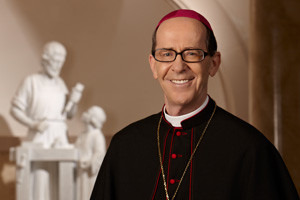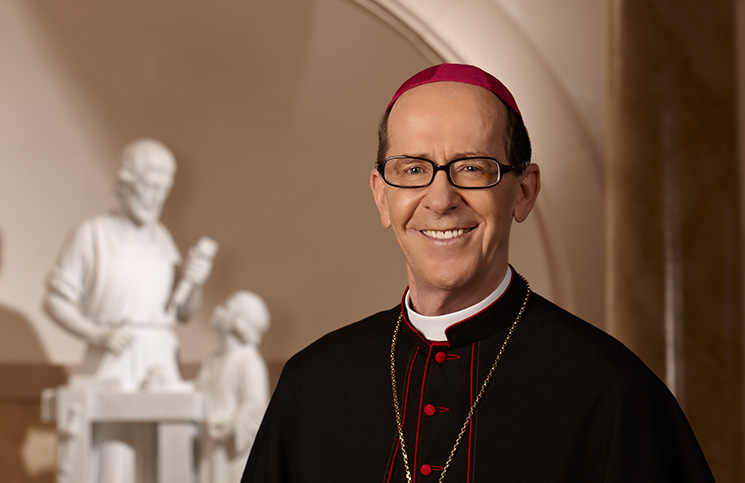If you asked Catholics in the United States in the 1950s if it was possible to be fully Catholic and fully American, most would have answered with an enthusiastic YES! In the first decade after World War II where Catholics and non-Catholics had fought side-by-side against common enemies, simultaneously overcoming some deep-seated prejudices among themselves, the great majority of Catholics had few if any worries about the compatibility of the Catholic faith with American culture. Do we still feel that way today?
Can we still be Catholic and American?
Sixty years ago when Catholics were pursuing higher education as never before, when vocations to the priesthood and religious life were at an all time high level, when Catholic hospitals and schools were expanding and flourishing at unprecedented rates, most Catholics in the United States were proud to be here; and very few anticipated the tensions that would erupt within American culture in the 1960s and the crises that would fray the fabric of the Catholic community after the Second Vatican Council.

Now, over half a century later, many Catholics have at best ambivalent feelings about the relationship between Catholicism and America. So much has changed since the good old days of the ’50s. Consider, for example, the following: 45 years of legalized abortion has killed more than 50 million unborn children, the HHS mandates of the federal government seriously threaten religious liberty, and the powerful political and other societal forces gravely weaken the institution of marriage and with it serious threats to the well-being of children. Should Catholics still be excited about being American citizens?
Do we even have a problem?
Last year, the archbishop of Toronto, Cardinal Thomas Collins, spoke of the obstacles to the New Evangelization found in Canada and the United States today. He said: “Public opinion polls indicate a disturbing phenomenon… While we are trying to evangelize, the rulers of this age, who shape popular culture, are effectively de-evangelizing many Christians. Often the misguided ideas against which we speak are increasingly attractive, and the principles we affirm are unattractive, to Catholics as much as any others, who are unconsciously absorbing the false wisdom of the age.”
What is it in American society today that makes “misguided ideas” attractive? And what makes solid principles of Catholic faith and morals unattractive? It is not hard to see how this cultural phenomenon greatly hinders efforts of the Church in North America to bear witness to the saving message of Jesus Christ. But how many even see and acknowledge that we have a problem?
The depth of the present crisis is evidenced in the fact that large numbers of Catholics, being more embedded in our secularist culture than in the life of the Church, feel quite at home in this world. Not only do they not feel motivated to work for cultural change, writes Russell Shaw in his new book “American Church,” they do not even see a problem, not even feel a need to take a good, hard look at what is happening to the basic foundations of American society and at its corrosive effect on the Church and other faith-based institutions, and upon human dignity and the foundational institutions of society, especially marriage. As Russell writes (p. 13), “On the evidence, many appear neither ready nor willing to provide a Christian critique of things like legalized abortion… the contraceptionist consumerist mentality that dominates the American dream of material success, the idol of American exceptionalism abroad, and much else in the world view of contemporary secular America in serious tension with their religious tradition.”
Keep your eye on the Chair
A recent headline caught my eye, NOT because it conjures up memories of a former basketball coach but because it expresses the opposite of apathy. The headline read: “Sometimes, Throw a Chair.” The greatest challenge that we Catholics face in America is indifferentism, not Americanism; it is not a problem of being too patriotic but a problem of being morally lazy, intellectually sloppy and spiritually asleep.
Many things can freeze us in our tracks and keep us from responding to crises that threaten us individually or as a community: from doubts and fears on the one hand to failure even to notice that there is a crisis. We can fail even to notice “a progressive secularization of society and a kind of eclipse of the sense of God” (as Pope Benedict XVI described the crisis); or even worse we can fail even to care about this dramatic drift away from faith in God that has poisoned the culture of so-called “first world” countries like America.
In striking contrast to this sickly slide into sloth that has weakened our American culture, we have the startling words of Jesus (Lk 12:49), “I have come to set a fire on the earth, how I wish it were already blazing!” We also have the refreshing spontaneity and compelling witness of Pope Francis who continually challenges mediocrity even as he inspires love. His personal witness to Christ has been formed in the crucible of suffering, in his relentless advocacy for the forgotten and poor, and in his courageous defense of human dignity and religious freedom before hostile governments in his native land.
Pope Francis, perhaps more by his own person and deeds than his words, is awakening Catholics to our mission from Christ at this pivotal point in history. We don’t have to worry about Pope Francis throwing a chair but we can be sure that his witness to Christ from the Chair of Peter will continue to make the indifferent uncomfortable and ignite the fire of love among followers of Christ today. May we welcome that fire with grateful hearts.
Next time, I will look more closely at the relationship between the Church and American culture, at the challenges we Catholics have faced and continue face today, and what we must do in order to be faithful to our mission. The vast field of evangelization in America has both disturbing trends and grace-filled marvels. It is precisely in face of both that we have the duty and privilege of knowing, loving and serving Jesus Christ.






![[VIDEO] Make Sunday feel like Sunday again](https://www.catholicsun.org/wp-content/uploads/2021/04/2021-YOUTUBE-BISHOP-MESSAGE-THUMBNAIL-ENGLISH-218x150.png)